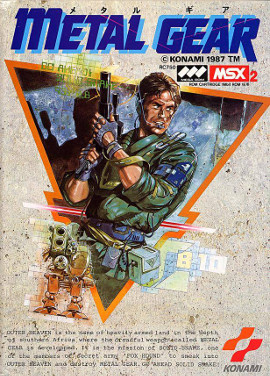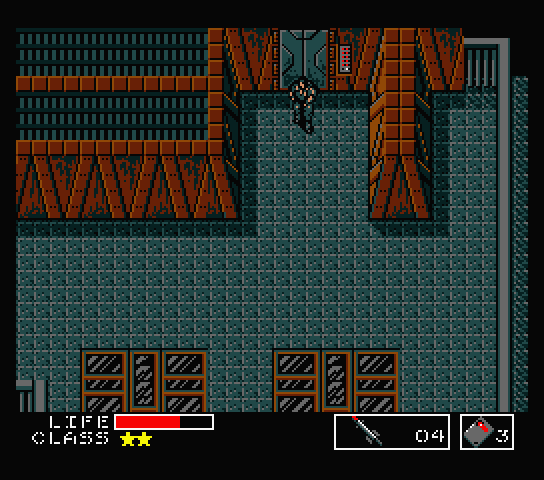Metal Gear is a series that I've wanted to cover for a long time. The first game is now 30 years old, so now would be the right time to talk about the main entries one by one. Does this hold up after many years? Let's find out.
Do take note that I'm only covering the MSX2 game, which is what later re-releases are based on. I've never played the NES port, which was made without Hideo Kojima's involvement. All I know is that it made drastic changes in the level design, had references to politics in real life, and featured grammatical errors. The translators must have "feel asleep" while working on it.
Off the bat, we are introduced to the player character, Solid Snake, a rookie member of a special forces group called FOXHOUND, as he sneaks into an enemy base called Outer Heaven. His objective is to rescue an imprisoned Gray Fox, and destroy the ultimate weapon being constructed there: Metal Gear, a nuclear equipped walking battle tank. Snake is assisted via radio by his commanding officer, Big Boss, and members of the Resistance: Kyle Schneider, Diane, and Jennifer. Each member can be called for certain information like necessary items or strategies to defeat bosses.
If anyone familiar with the later titles is expecting some kind of gripping story, you're not gonna find it here. An agent infiltrates a base, sneaks around, fights some bad guys, and encounters Metal Gear. End of story. The only thing of value in the story is the twist at the end, which I'm not going to spoil. There really isn't much going for it when it comes to characters either, though I sincerely doubt Kojima thought of a huge story ahead of time. For now, the story is a lot more simplistic and straightforward unlike later entries, but I'll get to them when I do.
The music is one of the highlights despite having only about a handful of tracks. "Theme of Tara" is the most memorable, mostly because it plays around 75% of the game, so you'll be hearing it a lot and end up humming the entire tune. Of course, it's not the only track worthy of mention. The alert theme's fast pace and beat gives the player a sense of wanting to escape the enemy's line of sight. Lastly there is "Sneaking Mission" which is a calm, but foreboding track.
As a stealth game, the player must navigate Snake throughout Outer Heaven while avoiding detection. The enemy's field of vision consists of a straight line, so if you're in front of an enemy, you'll get spotted. If spotted, an exclamation point (!) will appear above the guard's head and the alarm will be raised. The alarm will drop when Snake escapes their line of sight.
At the start of the game, Snake is unarmed and can only clear out enemies by punching them. As the game progresses, however, he will have access to weapons like a handgun, grenade launcher, and remote control missile to name a few. They're not only necessary for taking out enemies, but clearing out obstacles like hollow walls, which Snake can also punch in order to determine that. Don't get gun-crazy, though, because unless you equip the handgun with a suppressor, gunshot can immediately set off the alarm. For an early stealth game, there was some thought put into noise, so combat is most definitely discouraged here.
The survival aspect is also expanded upon, with Snake being able to carry items like rations, which can replenish his health, and cardboard boxes, used for hiding from enemies. You heard that right: you can use cardboard boxes to hide from enemies. It has since become the series' staple item. When you think of Metal Gear, the box might be the first one to think of.
However, there is a limit to the amount of items you can carry. Below the health bar is a star rank. After rescuing five hostages, Snake's rank will increase to one star, increasing the amount of ammo and rations he can carry. Kill a hostage, however, and your rank will decrease. Believe me, you have to rank up if you're ever going to beat the game. The hostages will not only serve to increase your rank, but some of them will also provide tips that will come in handy in the future, which encourages exploration.
The main items you have to get are key cards, which will open certain doors to new areas depending on the level. For example, there is a door that requires Card 3 in order to open, so you have to equip Card 3 in order to enter. This is one of my least favorite aspects of the game because the doors are not labeled with the number, forcing me to equip each card I have until I find the right one.
There is even this one moment in the game where you enter the first gas room. Big Boss, like a good commanding officer (sarcasm) calls saying that he forgot to mention to put on a gas mask while in these types of rooms. You have no choice but take some damage when you enter the room. You take even more damage as you select the correct card key to enter, since you cannot equip the gas mask at the same time. That right there is sloppy design.
Parts of the level design are pretty much what fall short in this game. The gas room is not the only frustrating part. There is one section of Outer Heaven that is full of trapdoors. Nobody can see them coming, at least the first time, and when the player falls into one of them, it's game over. This part right here requires a lot of trial and error. Sometimes they even block your way, forcing you to go back to the previous room and back again so that it resets.
Next, I found the boss fights to be cheap and easy. There really isn't that much strategy, either. All you do is just shoot them. Even the fight with the Hind D is pretty cheap since all it does is fire at you and you can easily use the grenade launcher after standing in its blind spot.
There is some strategy when fighting the titular weapon itself, but I found the design choice questionable. You have to memorize (or write down) this sequence on which legs to place a plastic explosive in order. Sounds simple, right? Well, you have to avoid the cameras that fire lasers at the same time. Sure, it prevents this "boss fight" from being monotonous, but it wasn't fun at all. Maybe I shouldn't be too hard on this since this game from the late 1980's and boss fights weren't as grand as today's. Still, who thought it was a good idea to memorize a sequence?
Lastly, I hated the backtracking. I've mentioned before that card keys are needed to progress. There are doors which you cannot open unless you have the right one and you have to find the next card key. Not just that, but there are two elevators in one part of the game: one that will only go up, and another that will only go down. If you happen to miss something important, you have to go all the way back and use one of these elevators again, which is extremely tedious.
The story isn't anywhere as deep or thought-provoking as other games, with the twist at the end being the only part of value. I'm not sure if fans of the later games will like this one, but hardcore fans definitely will. I can say this: whatever you feel towards the original Metal Gear, do know that it is one of the most important games ever made. In the end, I say...
THINK FOR YOURSELF
Of course, this was only the beginning. Tune in next time as I review the even better sequel: Metal Gear 2: Solid Snake.



No comments:
Post a Comment